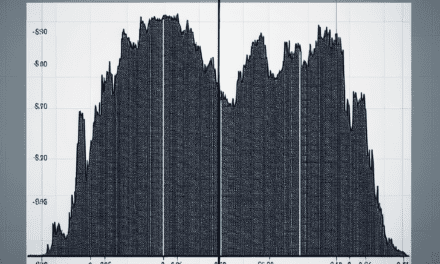“Championing Growth: Jamie Dimon Advocates for Balanced Regulation”
Introduction
Jamie Dimon, the CEO of JPMorgan Chase, has been vocal in urging a reevaluation of the regulatory landscape affecting the financial industry. As a prominent figure in global finance, Dimon has consistently highlighted the potential drawbacks of excessive regulation, arguing that it can stifle innovation, limit economic growth, and hinder the competitive edge of American financial institutions on the global stage. His calls for pushback against stringent regulatory measures reflect a broader concern within the industry about finding a balance between necessary oversight and fostering an environment conducive to growth and innovation. Dimon’s stance underscores the ongoing debate about the role of regulation in ensuring financial stability while also promoting economic dynamism.
Impact Of Regulatory Pushback On Financial Markets
JPMorgan CEO Jamie Dimon has recently voiced his concerns regarding the increasing regulatory pressures on financial institutions, urging a more balanced approach to regulation. His remarks have sparked a significant debate within the financial community, highlighting the potential impact of regulatory pushback on financial markets. Dimon argues that while regulations are essential for maintaining stability and protecting consumers, excessive regulatory burdens can stifle innovation, limit growth, and ultimately hinder the competitiveness of financial institutions on a global scale.
To understand the implications of Dimon’s stance, it is crucial to consider the historical context of financial regulation. In the aftermath of the 2008 financial crisis, governments worldwide implemented stringent regulatory measures to prevent a recurrence of such an economic meltdown. These measures, including the Dodd-Frank Act in the United States and the Basel III international regulatory framework, aimed to enhance transparency, increase capital requirements, and reduce systemic risk. While these regulations have undoubtedly contributed to a more resilient financial system, they have also introduced complexities and compliance costs that some argue are disproportionate to their benefits.
Dimon’s call for regulatory pushback is rooted in the belief that a more nuanced approach is necessary to strike a balance between safeguarding the financial system and fostering economic growth. He contends that overly rigid regulations can deter financial institutions from taking calculated risks, which are essential for driving innovation and supporting economic expansion. Moreover, Dimon emphasizes that excessive regulation can lead to unintended consequences, such as pushing financial activities into less regulated sectors or jurisdictions, thereby increasing systemic risk rather than mitigating it.
The potential impact of regulatory pushback on financial markets is multifaceted. On one hand, easing certain regulatory constraints could provide financial institutions with greater flexibility to allocate resources more efficiently, invest in new technologies, and expand their services. This, in turn, could enhance their competitiveness and contribute to a more dynamic and robust financial sector. On the other hand, reducing regulatory oversight could raise concerns about the stability and integrity of financial markets, particularly if it leads to a relaxation of risk management practices or a decline in consumer protection standards.
Furthermore, the global nature of financial markets necessitates a coordinated approach to regulation. Dimon’s advocacy for regulatory pushback must be considered within the broader context of international regulatory harmonization. Divergent regulatory frameworks across jurisdictions can create challenges for multinational financial institutions, leading to inefficiencies and potential arbitrage opportunities. Therefore, any efforts to recalibrate regulatory requirements should be accompanied by dialogue and collaboration among regulators worldwide to ensure consistency and coherence.
In conclusion, Jamie Dimon’s call for a reassessment of regulatory pressures on financial institutions underscores the need for a balanced approach that considers both the benefits and drawbacks of regulation. While it is essential to maintain a robust regulatory framework to safeguard the financial system, it is equally important to ensure that regulations do not stifle innovation or hinder economic growth. As policymakers and industry leaders engage in this ongoing debate, the challenge lies in finding the right equilibrium that promotes stability, fosters competitiveness, and supports the long-term health of financial markets. The outcome of this discourse will undoubtedly shape the future landscape of the financial industry and its role in the global economy.
Jamie Dimon’s Vision For A Balanced Regulatory Environment
In recent discussions surrounding the financial sector, JPMorgan Chase CEO Jamie Dimon has emerged as a vocal advocate for a more balanced approach to regulation. His perspective is rooted in the belief that while regulation is essential for maintaining the stability and integrity of financial markets, excessive or poorly designed regulations can stifle innovation and economic growth. Dimon’s stance is particularly relevant in the current climate, where the financial industry faces an evolving landscape of regulatory challenges.
Dimon argues that a nuanced approach to regulation is necessary to foster a healthy financial ecosystem. He acknowledges the critical role that regulations play in preventing the kind of systemic risks that led to the 2008 financial crisis. However, he also emphasizes the importance of ensuring that these regulations do not become overly burdensome. In his view, a regulatory environment that is too restrictive can hinder the ability of financial institutions to lend, invest, and support economic development. This perspective is especially pertinent as the global economy seeks to recover from the disruptions caused by the COVID-19 pandemic.
To illustrate his point, Dimon often cites the example of small and medium-sized enterprises (SMEs), which are vital to economic growth and job creation. He contends that excessive regulation can disproportionately impact these businesses, making it more difficult for them to access the capital they need to expand and innovate. By advocating for a more balanced regulatory framework, Dimon hopes to create an environment where SMEs can thrive, thereby contributing to a more robust and dynamic economy.
Moreover, Dimon highlights the importance of international cooperation in regulatory matters. In an increasingly interconnected world, financial markets are not confined by national borders. As such, Dimon calls for greater alignment and coordination among global regulators to ensure that regulations are consistent and effective across different jurisdictions. This approach, he argues, would help prevent regulatory arbitrage, where financial institutions exploit differences in regulations between countries to gain a competitive advantage.
In addition to advocating for a balanced regulatory environment, Dimon also underscores the need for regulatory frameworks to be adaptable and forward-looking. The rapid pace of technological advancement, particularly in areas such as fintech and digital currencies, presents both opportunities and challenges for the financial sector. Dimon believes that regulators must be proactive in understanding these developments and crafting regulations that encourage innovation while safeguarding against potential risks. By doing so, he envisions a regulatory environment that not only protects consumers and the financial system but also supports technological progress and economic growth.
Furthermore, Dimon stresses the importance of dialogue and collaboration between regulators and the financial industry. He argues that open communication and cooperation are essential for developing regulations that are both effective and practical. By engaging with industry stakeholders, regulators can gain valuable insights into the potential impacts of proposed regulations and make informed decisions that balance the needs of all parties involved.
In conclusion, Jamie Dimon’s vision for a balanced regulatory environment reflects a pragmatic approach to the challenges facing the financial sector. By advocating for regulations that are both effective and adaptable, he seeks to create a framework that supports economic growth, innovation, and stability. As the financial industry continues to evolve, Dimon’s perspective serves as a reminder of the importance of thoughtful and collaborative regulatory practices.
The Role Of Leadership In Navigating Financial Regulations
In the complex landscape of global finance, the role of leadership is pivotal in navigating the intricate web of regulations that govern the industry. Jamie Dimon, the CEO of JPMorgan Chase, has consistently emphasized the importance of strategic leadership in addressing the challenges posed by financial regulations. His recent call for a more assertive stance against certain regulatory measures highlights the delicate balance that leaders must maintain between compliance and innovation.
Dimon’s perspective is rooted in the belief that while regulations are essential for maintaining stability and protecting consumers, they can also stifle growth and innovation if not carefully calibrated. This viewpoint is particularly relevant in an era where financial institutions are under increasing pressure to adapt to rapid technological advancements and evolving market dynamics. As such, Dimon advocates for a regulatory framework that is both robust and flexible, allowing banks to operate efficiently while safeguarding the interests of stakeholders.
Transitioning from this foundational understanding, it is crucial to recognize that effective leadership in the financial sector involves not only compliance with existing regulations but also proactive engagement with policymakers. Dimon has consistently championed the idea that banks should play an active role in shaping the regulatory environment. By engaging in constructive dialogue with regulators, financial leaders can help ensure that new rules are both practical and conducive to economic growth. This approach requires a deep understanding of the regulatory landscape, as well as the ability to anticipate future trends and challenges.
Moreover, Dimon’s call for pushback against certain regulatory measures underscores the need for leaders to advocate for their institutions’ interests while maintaining a commitment to ethical standards. This involves a careful assessment of the potential impact of regulations on business operations and the broader economy. By articulating the potential drawbacks of overly stringent regulations, leaders like Dimon can help foster a more balanced approach that supports innovation without compromising financial stability.
In addition to engaging with regulators, effective leadership in navigating financial regulations also involves fostering a culture of compliance within the organization. Dimon has emphasized the importance of instilling a strong ethical framework and a commitment to transparency among employees. This internal culture not only ensures adherence to regulatory requirements but also enhances the institution’s reputation and trustworthiness in the eyes of clients and investors.
Furthermore, as financial markets become increasingly interconnected, leaders must also consider the global implications of regulatory changes. Dimon’s advocacy for a more nuanced approach to regulation reflects the need for international cooperation and coordination. By aligning regulatory standards across borders, financial institutions can operate more seamlessly in the global marketplace, reducing the risk of regulatory arbitrage and enhancing overall market stability.
In conclusion, Jamie Dimon’s call for a more assertive stance against certain financial regulations highlights the critical role of leadership in navigating the complex regulatory environment. By engaging with policymakers, fostering a culture of compliance, and considering the global implications of regulatory changes, leaders can help ensure that financial institutions remain resilient and innovative in the face of evolving challenges. As the financial landscape continues to evolve, the insights and actions of leaders like Dimon will be instrumental in shaping a regulatory framework that balances the need for stability with the imperative for growth and innovation.
Historical Context: JPMorgan’s Stance On Regulation

JPMorgan Chase & Co., one of the largest and most influential financial institutions in the world, has long been at the forefront of discussions surrounding financial regulation. The bank’s CEO, Jamie Dimon, has consistently been a vocal figure in these debates, often urging a more measured approach to regulatory frameworks. To understand JPMorgan’s stance on regulation, it is essential to delve into the historical context that has shaped its perspective.
In the aftermath of the 2008 financial crisis, regulatory bodies worldwide implemented a series of stringent measures aimed at preventing a recurrence of such a catastrophic event. The Dodd-Frank Wall Street Reform and Consumer Protection Act in the United States, for instance, introduced comprehensive regulations designed to increase transparency and reduce systemic risk. While these measures were intended to stabilize the financial system, they also imposed significant compliance costs and operational challenges on banks.
JPMorgan, under Dimon’s leadership, has often expressed concerns about the potential overreach of these regulations. Dimon has argued that while regulation is necessary to ensure the stability and integrity of financial markets, excessive or poorly designed rules can stifle innovation, limit economic growth, and inadvertently create new risks. This perspective is rooted in the belief that a balance must be struck between safeguarding the financial system and allowing banks the flexibility to operate efficiently and competitively.
Throughout the years, Dimon has consistently advocated for a regulatory environment that is both effective and adaptable. He has emphasized the importance of tailoring regulations to reflect the evolving nature of financial markets and the unique characteristics of different financial institutions. This approach, he argues, would not only enhance the resilience of the financial system but also promote a more dynamic and competitive banking sector.
Moreover, Dimon has highlighted the need for international coordination in regulatory efforts. Given the global nature of financial markets, he contends that disparate regulatory regimes can lead to fragmentation and inefficiencies. By fostering greater collaboration among regulatory bodies across countries, Dimon believes that a more coherent and effective regulatory framework can be achieved, benefiting both financial institutions and the broader economy.
In recent years, Dimon’s calls for regulatory reform have gained renewed attention as technological advancements and the rise of fintech companies have transformed the financial landscape. He has pointed out that traditional banks are increasingly competing with tech-driven firms that operate under different regulatory standards. This, he argues, creates an uneven playing field and underscores the need for a regulatory approach that accommodates innovation while ensuring fair competition.
In conclusion, JPMorgan’s stance on regulation, as articulated by Jamie Dimon, reflects a nuanced understanding of the complexities inherent in financial oversight. By advocating for a balanced, adaptable, and internationally coordinated regulatory framework, Dimon seeks to ensure that regulations serve their intended purpose without imposing undue burdens on financial institutions. As the financial landscape continues to evolve, JPMorgan’s perspective on regulation will likely remain a critical voice in shaping the future of financial oversight. Through ongoing dialogue and collaboration with regulators, Dimon aims to contribute to a regulatory environment that supports both stability and growth in the global financial system.
Potential Consequences Of Reduced Financial Oversight
JPMorgan CEO Jamie Dimon has recently voiced concerns over the increasing regulatory pressures on financial institutions, urging a reconsideration of the current trajectory towards heightened oversight. Dimon’s stance highlights a critical debate within the financial sector: the balance between necessary regulation and the potential stifling of economic growth and innovation. As the leader of one of the world’s largest banks, Dimon’s perspective carries significant weight, prompting a closer examination of the potential consequences of reduced financial oversight.
To begin with, it is essential to understand the rationale behind Dimon’s call for pushback against regulation. Proponents of reduced oversight argue that excessive regulation can hinder the ability of financial institutions to operate efficiently and competitively. They contend that a more relaxed regulatory environment could foster innovation, allowing banks to develop new financial products and services that better meet the needs of consumers and businesses. Furthermore, they suggest that less stringent regulations could lead to increased lending, thereby stimulating economic growth and job creation.
However, while the potential benefits of reduced regulation are appealing, it is crucial to consider the possible risks associated with such a shift. The 2008 financial crisis serves as a stark reminder of the dangers posed by insufficient oversight. In the years leading up to the crisis, a lack of stringent regulation allowed for the proliferation of risky financial practices, ultimately resulting in a global economic downturn. This historical context underscores the importance of maintaining a robust regulatory framework to safeguard the stability of the financial system.
Moreover, reduced oversight could lead to increased systemic risk, as financial institutions may engage in riskier behavior without the constraints of stringent regulations. This could potentially result in a repeat of past financial crises, with significant repercussions for the global economy. Additionally, diminished regulation might undermine consumer protection, leaving individuals vulnerable to predatory lending practices and other forms of financial exploitation.
In light of these considerations, it is imperative to strike a balance between fostering innovation and ensuring financial stability. While Dimon’s call for reduced regulation highlights legitimate concerns about the potential drawbacks of excessive oversight, it is essential to approach this issue with caution. Policymakers must carefully evaluate the potential consequences of any regulatory changes, taking into account both the benefits and risks associated with reduced oversight.
Furthermore, it is important to recognize that regulation is not a one-size-fits-all solution. Different financial institutions may require varying levels of oversight, depending on their size, complexity, and risk profile. As such, a nuanced approach to regulation is necessary, one that takes into account the unique characteristics of each institution while ensuring the overall stability of the financial system.
In conclusion, Jamie Dimon’s call for pushback against regulation raises important questions about the future of financial oversight. While there are potential benefits to reducing regulatory burdens, it is crucial to carefully consider the risks associated with such a shift. By striking a balance between innovation and stability, policymakers can help ensure a resilient and dynamic financial system that supports economic growth while protecting consumers and maintaining systemic stability. As this debate continues, it will be essential for stakeholders to engage in thoughtful dialogue, weighing the potential consequences of reduced oversight against the need for a robust regulatory framework.
Jamie Dimon’s Influence On Global Banking Policies
Jamie Dimon, the long-serving CEO of JPMorgan Chase, has long been a prominent figure in the global banking industry, wielding significant influence over financial policies and practices. His recent call for a pushback against regulation has sparked considerable debate among policymakers, industry leaders, and financial analysts. Dimon’s stance is rooted in his belief that excessive regulation can stifle innovation, hinder economic growth, and ultimately, limit the competitive edge of financial institutions. As the head of one of the world’s largest banks, Dimon’s opinions carry substantial weight, and his advocacy for a more balanced regulatory environment is shaping discussions on the future of banking policies.
Dimon’s argument is not without merit. He contends that while regulation is necessary to ensure stability and protect consumers, an overly stringent regulatory framework can lead to unintended consequences. For instance, he points out that excessive compliance costs can burden banks, particularly smaller institutions, making it difficult for them to compete with larger players. This, in turn, can lead to reduced competition in the banking sector, which may not be in the best interest of consumers. Furthermore, Dimon argues that a heavy regulatory hand can stifle innovation by creating barriers to entry for new technologies and financial products, which are essential for the evolution of the banking industry.
In addition to these concerns, Dimon highlights the global nature of banking and the need for international cooperation in regulatory matters. He emphasizes that disparate regulatory standards across countries can create inefficiencies and complexities for multinational banks, which must navigate a patchwork of rules and requirements. By advocating for a more harmonized approach to regulation, Dimon suggests that banks can operate more efficiently on a global scale, ultimately benefiting consumers and economies worldwide.
However, Dimon’s call for regulatory pushback is not without its critics. Some argue that the financial crisis of 2008 serves as a stark reminder of the dangers of under-regulation. They contend that robust regulatory frameworks are essential to prevent the kind of risky behavior that led to the crisis and to protect the financial system from future shocks. Critics also point out that while Dimon’s focus on innovation and competition is important, it should not come at the expense of financial stability and consumer protection.
Despite these differing viewpoints, Dimon’s influence on global banking policies remains significant. His ability to articulate the challenges and opportunities facing the industry has made him a key voice in shaping the regulatory landscape. As policymakers and industry leaders continue to grapple with the complexities of financial regulation, Dimon’s perspectives will likely play a crucial role in guiding the conversation.
In conclusion, Jamie Dimon’s call for a pushback against regulation underscores the ongoing debate over the balance between oversight and innovation in the banking sector. While his arguments highlight important considerations regarding competition, innovation, and global cooperation, they also raise questions about the potential risks of deregulation. As the global banking industry continues to evolve, finding the right balance between these competing priorities will be essential to ensuring a stable, competitive, and innovative financial system. Dimon’s influence in this arena will undoubtedly continue to shape the future of global banking policies.
Analyzing The Debate: Regulation Vs. Deregulation In Banking
In the ongoing debate over regulation versus deregulation in the banking sector, JPMorgan Chase CEO Jamie Dimon has emerged as a vocal advocate for pushing back against what he perceives as excessive regulatory measures. Dimon’s stance is rooted in the belief that overregulation can stifle innovation, limit economic growth, and ultimately hinder the ability of financial institutions to serve their clients effectively. As the leader of one of the world’s largest banks, Dimon’s perspective carries significant weight in discussions about the future of banking regulation.
To understand Dimon’s position, it is essential to consider the broader context of the regulatory environment in which banks operate. Following the 2008 financial crisis, governments worldwide implemented stringent regulations to prevent a recurrence of such a catastrophic event. The Dodd-Frank Act in the United States, for instance, introduced comprehensive reforms aimed at increasing transparency and reducing systemic risk. While these measures were designed to safeguard the financial system, they also imposed substantial compliance costs and operational constraints on banks.
Dimon argues that the pendulum has swung too far in favor of regulation, creating an environment where banks are burdened with excessive red tape. He contends that this regulatory overreach can impede banks’ ability to lend, invest, and innovate, ultimately constraining economic growth. Moreover, Dimon suggests that the complexity and volume of regulations can lead to unintended consequences, such as encouraging risk-taking behavior in less regulated sectors or driving financial activities into the shadows.
Transitioning to the potential benefits of deregulation, Dimon and other proponents argue that a more balanced approach could unleash the full potential of the banking sector. By reducing unnecessary regulatory burdens, banks could allocate more resources toward developing innovative financial products and services. This, in turn, could enhance competition, improve customer experiences, and drive economic expansion. Furthermore, a more flexible regulatory framework could enable banks to respond more swiftly to changing market conditions, thereby enhancing their resilience and adaptability.
However, it is crucial to acknowledge the counterarguments presented by advocates of robust regulation. They emphasize that the primary purpose of regulation is to protect consumers, maintain financial stability, and prevent the kind of reckless behavior that led to the 2008 crisis. From this perspective, regulation serves as a necessary check on the power and influence of large financial institutions, ensuring that they operate in a manner that prioritizes the public good over short-term profits.
In navigating this complex debate, it is important to strike a balance between regulation and deregulation that addresses the concerns of both sides. Policymakers must carefully evaluate the impact of existing regulations and consider adjustments that promote innovation and growth without compromising financial stability. This requires ongoing dialogue between regulators, industry leaders, and other stakeholders to identify areas where regulatory reform is warranted and to ensure that any changes are implemented thoughtfully and effectively.
In conclusion, Jamie Dimon’s call for pushback against regulation highlights the need for a nuanced approach to banking oversight. While the benefits of deregulation are compelling, it is essential to proceed with caution to avoid undermining the safeguards that protect the financial system and its participants. As the debate continues, finding the right balance will be crucial to fostering a banking environment that supports both innovation and stability.
Q&A
1. **Question:** What is Jamie Dimon’s position on financial regulation?
– **Answer:** Jamie Dimon has expressed concerns about excessive financial regulation, urging for a balanced approach that does not stifle economic growth or innovation.
2. **Question:** Why does Jamie Dimon believe there should be pushback against regulation?
– **Answer:** Dimon believes that overly stringent regulations can hinder the competitiveness of financial institutions, limit economic growth, and reduce the ability of banks to serve their customers effectively.
3. **Question:** How has Jamie Dimon communicated his views on regulation?
– **Answer:** Dimon has communicated his views through public statements, interviews, and shareholder letters, where he often discusses the impact of regulation on the banking industry.
4. **Question:** What specific regulations has Jamie Dimon criticized?
– **Answer:** Dimon has criticized aspects of the Dodd-Frank Act, particularly those he views as overly burdensome or complex, and has called for reforms to make regulations more efficient and effective.
5. **Question:** What alternatives to current regulations has Jamie Dimon proposed?
– **Answer:** Dimon has suggested simplifying regulations, focusing on risk-based approaches, and ensuring that rules are clear and consistent to avoid unnecessary compliance costs.
6. **Question:** How does Jamie Dimon view the role of banks in the economy?
– **Answer:** Dimon views banks as essential to economic growth, providing necessary capital and financial services to businesses and consumers, and believes that regulations should support rather than hinder this role.
7. **Question:** What impact does Jamie Dimon believe regulation has on global competitiveness?
– **Answer:** Dimon argues that excessive regulation can put U.S. banks at a disadvantage compared to international competitors, potentially leading to a loss of market share and influence in the global financial system.
Conclusion
JPMorgan CEO Jamie Dimon has consistently advocated for a balanced approach to financial regulation, emphasizing the need for regulatory frameworks that do not stifle economic growth or innovation. Dimon argues that excessive regulation can hinder the competitiveness of financial institutions and the broader economy. He calls for a regulatory environment that ensures stability and consumer protection while also allowing banks to effectively serve their clients and support economic development. His stance highlights the ongoing debate between maintaining robust oversight to prevent financial crises and fostering an environment conducive to business growth and innovation.





